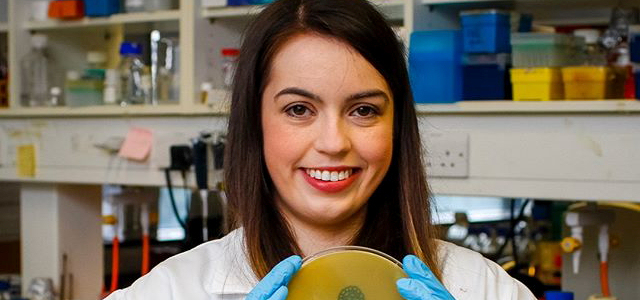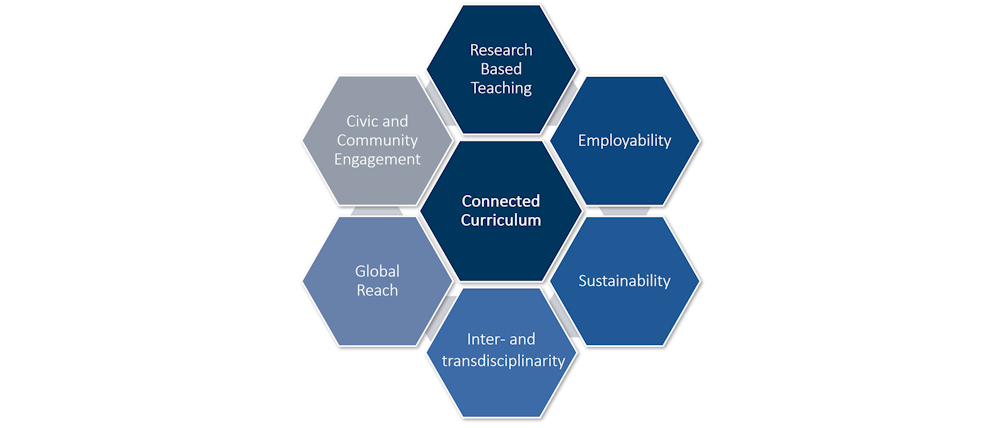Priority 1: Develop a Connected Curriculum, building on existing strengths and best practice globally

The Academic Strategy envisages the enhancing and building of connections to provide curricular coherence and to enhance the student and staff experience. Six components have been identified as comprising the Connected Curriculum at UCC, namely research-based teaching, employability, sustainability, inter- and transdisciplinarity, global reach, civic and community engagement. This priority seeks to surface good practice and provide inspiration and tools to support staff to integrate the distinct components of the Connected Curriculum framework in their teaching. The implementation of the Connected Curriculum will ensure that these connected experiences are articulated and visible in the course descriptions and learning outcomes.

UCC's Connected Curriculum framework
ACTION 1
Incorporate peer-review approaches to review current curriculum offerings and surface and document good practice in connected approaches. [Completed]
A review of existing programmes at UCC was undertaken to assess how these align with the Connected Curriculum. This was achieved by identifying keywords that reflect the active incorporation of the six elements of the Connected Curriculum and using these to interrogate programme descriptions. Work is underway to explore the possibility of automating the collection of information on the occurrence of these keywords in programme descriptions in the future. A self-evaluation tool was developed to assist programme coordinators to review the alignment of programmes and modules with the Connected Curriculum framework. This will support the further integration of the six 6 Connected Curriculum elements into courses and programmes.
ACTION 2
Recognise and promote good practice. [Completed]
A number of case studies of good practice have been collected across the four colleges and Adult Continuing Education which illustrate how a number of the Connected Curriculum elements can be integrated into a programme. A showcase of existing good practice took place as part of the upcoming Learning Connections 2019: Spaces, People, Practice conference at UCC in December 2019 (Further details here).
ACTION 3
Develop and extend good practice through staff development efforts and optimisation of existing UCC initiatives that can support the delivery of a Connected Curriculum. [Completed]
The focus is to ensure that formal and non-formal CPD activities relating to learning and teaching ware aligned with our Connected Curriculum and the ambition to embed this in programmes across UCC. To promote good practice in the implementation of a Connected Curriculum within the University a short online course on the “Connected Curriculum and You” was developed to enable staff to gain an understanding of the Connected Curriculum and how it operates in UCC (Further details here). This Digital Badge course was launched in April 2020 and has been completed by a wide range of staff across UCC. All staff are encouraged to participate in this course which comprises a number of online modules followed by an interactive workshop supporting peer-to-peer learning. Documentation relating to Learning & Teaching grants and awards at UCC has been updated to align with the ambitions of thee Academic Strategy, particularly the Connected Curriculum.
ACTION 4
Create opportunities for students to be co-creators of and partners in curriculum design and development to maximise their learning. [Completed]
A case study on how to engage students as partners in Curriculum was developed for use as a resource for participants in the Learning Design workshops as well as disseminated to staff more broadly. The case study comprises a document outlining the process, relevant tools and a video capturing the reflections of the participating students and staff. In a joint initiative with the Students’ Union, a series of guidelines will be developed based on best international practice in involving students as partners in curriculum design. The Design Sprint professional development activity has been launched. This models a student-as-partner approach in curriculum development to support the integration of civic-engagement and sustainability in the curriculum. We were delighted to hav 19 staff and 50 students take part in the first iteration of this course in April 2021.
ACTION 5
Encourage curriculum revision and review of learning outcomes to embed the components of a Connected Curriculum, as relevant to the discipline.
This action will build on other work packages in the Academic Strategy including Priority 3. The self-evaluation tool developed under Action 1 will be included in the programme approval process for new courses and supports will be put in place to for new programme curriculum development. Work is underway to incorporate prompts in module proposal forms and considerations regarding the future administration systems.
ACTION 6
Develop new curriculum offerings using the Connected Curriculum framework.
Similar to Action 5, this action will build on other work packages in the Academic Strategy including Priority 3 and supports will be put in place to for new programme curriculum development. The Learning Design workshops will support those developing new programmes as will the self-assessment tool.
ACTION 7
Develop Global Networks with like-minded universities.
This Action aims to share good practice examples that exemplify Connected Curriculum and highlight potential synergies with other HEIs. Case studies have been collected and video clips of key initiatives are being developed to support the online course on the Connected Curriculum. The Academic strategy is a key focus of emerging proposals for the European Universities initiative and the HEA Human Capital Initiative grant. Priority 1 team members are engaging in sharing information on the status of the Connected Curriculum within their own Colleges and networks. Abstracts are regularly submitted for conferences in 2020 and the potential for writing up some of the work for submission to relevant journals is being explored.
Team:
Lead sponsor: Interim Registrar Prof Stephen Byrne
Administrative Lead: Catherine O'Mahony, Director, Centre for the Integration of Research, Teaching and Learning (CIRTL)
Team Members:
- Edmond Byrne, Chair of Process & Chemical Engineering
- Stephen Byrne, Dean of Undergraduate Studies
- Emma Connolly, International Office
- Sally Cudmore, Alimentary Pharmabotic Centre
- Anne Marie Cooney, Deputy President & Registrar’s Office
- Sandra Irwin, Deputy President & Registrar's Office
- Armida de la Garza, Digital Humanities
- Eleanor Donoghue, Head of Career Services
- Aaron Frahill, Education Officer, Students Union
- Martin Galvin, Community Engagement
- Maria Kirrane, Sustainability Officer
- Karl Kitching, Equality, Diversity and Inclusion Unit
- Christopher Lynch, Restorative Dentistry
- John McNulty, Director of Academic Services
- Mike Murphy, Management and Marketing
- Rory O’Donnell, Postgraduate Student Officer, Students Union
Leas-Uachtarán agus Cláraitheoir/ Deputy President & Registrar
Contact us
First Floor, West Wing, Main Quadrangle, UCC, T12 YN60
